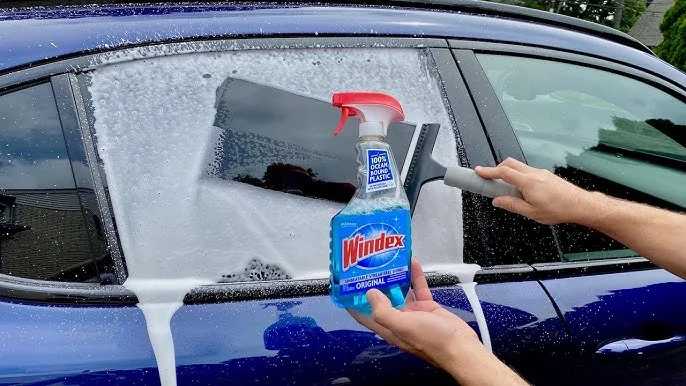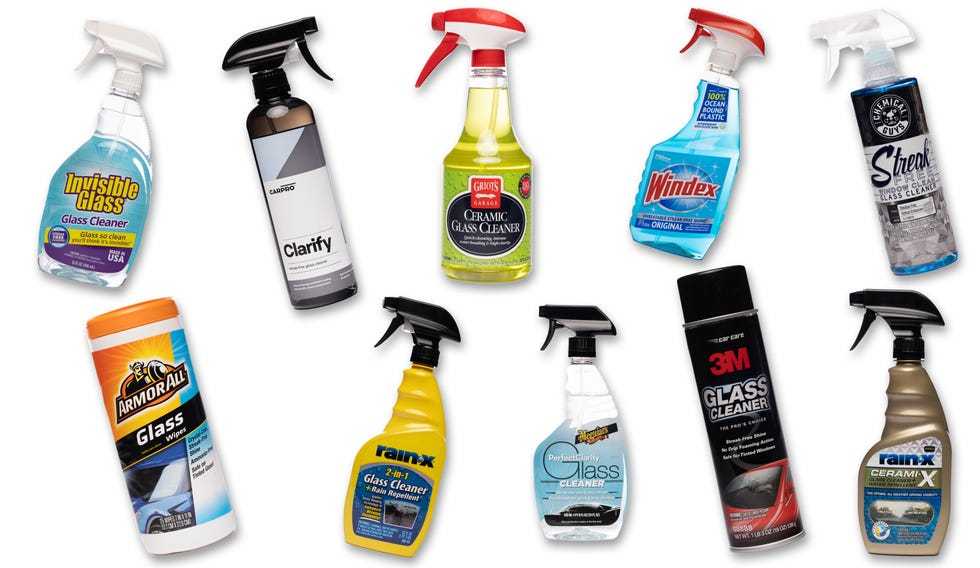Yes, you can use regular glass cleaner on your car windows, but with some caution. For most daily cleaning, a standard glass cleaner will do the job just fine and leave your windows sparkling. However, some regular glass cleaners might contain chemicals that could potentially harm tinted windows or leave streaks if not used properly. It’s best to choose a cleaner that is safe for automotive use and to avoid overuse of products containing ammonia, which can damage certain window films.
If you’re wondering whether a household glass cleaner is suitable for your vehicle, the quick answer is yes, but always check the label first. Using the right product ensures your car windows stay clear and undamaged, making your driving safer and your vehicle looking its best. Now, let’s dive into more details to help you clean your car windows effectively and safely.
Can You Use Regular Glass Cleaner on Car Windows?
Understanding the Composition of Regular Glass Cleaners
Regular glass cleaners are designed to remove dirt, smudges, and streaks from household glass surfaces like windows, mirrors, and glass tables. These cleaners typically contain chemicals such as ammonia, alcohol, or special detergents that break down grime. While effective at cleaning household glass, their composition may not always be suitable for car windows.
It’s important to understand that car windows, especially the windshield and side windows, are made from tempered or laminated glass with special coatings. These coatings serve various purposes such as UV protection, glare reduction, and water repellence. Using regular glass cleaner on car windows might harm these coatings over time.
Differences Between Household Glass Cleaners and Car Window Cleaners
Many household glass cleaners contain ammonia, which is excellent for cleaning indoors but can be problematic for car windows. Car window cleaners are often formulated without ammonia or contain milder ingredients. They are designed to be gentle yet effective on automotive glass and its protective coatings.
Key differences include:
- Chemical Composition: Household cleaners often contain ammonia, while car window cleaners tend to avoid it.
- Purpose: Regular cleaners focus on household glass, whereas car cleaners are tailored for automotive coatings and glass surfaces.
- Effect on Coatings: Regular cleaners may degrade coatings such as UV protection or water repellency on car windows.
Potential Risks of Using Regular Glass Cleaner on Car Windows
Applying regular glass cleaner on car windows can lead to several issues, especially if the cleaner contains ammonia or harsh chemicals.
Some risks include:
- Degradation of Coatings: Ammonia can remove or damage special coatings on automotive glass, reducing their effectiveness.
- Visibility Problems: Residue from harsh cleaners may leave streaks or film, impairing visibility especially during night driving or foggy conditions.
- Surface Damage: Over time, repeated use of inappropriate cleaners can cause scratches or dullness on the glass surface.
Knowing these risks emphasizes why it’s wise to use the right cleaning products specifically designed for vehicles.
Proper Products for Cleaning Car Windows
Using the correct product helps protect your vehicle’s glass and coatings. Car-specific glass cleaners are formulated to clean effectively without damaging coatings.
Common features of suitable car window cleaners:
- Ammonia-Free: Safer for coatings and less likely to cause streaks.
- Water-Based Formula: Gentle on surfaces yet effective at removing dirt and grime.
- Anti-Static and Water-Repellent Agents: Help prevent dust and water spots from sticking to the glass.
Popular brands and options include dedicated automotive glass cleaning sprays, microfiber cloths, and cleaning wipes designed specifically for vehicles.
How to Safely Clean Car Windows
Cleaning car windows properly involves more than just spraying cleaner and wiping the surface. Follow these steps for the best results:
- Choose the Right Cleaner: Use an ammonia-free, automotive-specific glass cleaner.
- Use Soft Cloths or Microfiber Towels: These materials prevent scratches and leave minimal streaks.
- Wipe in Circular Motions: This technique helps reduce streaks and ensures even cleaning.
- Dry Thoroughly: Use a clean, dry microfiber cloth to remove any remaining moisture and streaks.
- Avoid Direct Sunlight: Cleaning in direct sunlight can cause the cleaner to evaporate quickly, leaving streaks.
Regularly cleaning your windows prevents the buildup of dirt and improves visibility, making driving safer.
Using Household Glass Cleaners on Car Windows: A Closer Look
Some car owners might consider using regular household glass cleaners because they are readily available. However, examining their ingredients reveals potential problems.
Ammonia-based cleaners pose a particular concern because:
- Damage to Coatings: Ammonia can strip protective coatings that improve water runoff and reduce glare.
- Streaking and Smearing: These cleaners may leave residues that impair your vision during night driving.
- Potential for Surface Dulling: Repeated use can dull the glass surface over time.
In contrast, some household window cleaners labeled as “safe for tinted windows” may still contain chemicals that are not ideal for automotive glass.
Environmental and Safety Considerations
Using the wrong cleaner can have environmental impacts. Many household cleaners contain volatile organic compounds (VOCs) that can pollute the air and water.
Safety tips include:
- Work in Well-Ventilated Areas: To avoid inhaling harmful fumes.
- Wear Gloves: To protect your skin from chemical irritation.
- Follow Manufacturer Instructions: For both household and car-specific products.
Choosing eco-friendly options when possible helps reduce your carbon footprint and keeps your car environment safer.
Alternatives to Commercial Cleaners
Some car owners prefer natural cleaning methods. These can be effective if done correctly and with the right materials.
Natural cleaning options include:
- Vinegar and Water Solution: Mix equal parts of white vinegar and water, then wipe with a microfiber cloth.
- Rubbing Alcohol: Diluted with water, it can cut through grime without damaging coatings.
- Water and Dish Soap: Mild soap can help clean without harsh chemicals.
Always test a small area first before applying these solutions to the entire window to prevent damage or streaks.
Summary of Key Points
- Regular glass cleaners often contain ammonia, which can harm car window coatings.
- Car-specific window cleaners are formulated to be safe for automotive glass.
- Using the wrong product may cause streaks, fogging, or damage over time.
- Proper cleaning involves gentle wiping with microfiber cloths and appropriate products.
- Natural options like vinegar solutions can be used as eco-friendly cleaners, but test first.
In summary, using regular glass cleaner on car windows is not advisable due to potential damage and safety issues. The best approach is to choose cleaners made specifically for automotive use to keep your windows clear and protected.
Can You Use Window Cleaner to Clean Auto Glass?
Frequently Asked Questions
Can regular glass cleaner damage the tint on car windows?
Regular glass cleaners often contain ammonia or other harsh chemicals that can harm tinted windows. Over time, these substances may cause the tint to peel, discolor, or deteriorate. To protect your window tint, it’s best to use a cleaner specifically designed for tinted surfaces or a mild, ammonia-free glass cleaner. Always test a small area first to ensure it doesn’t affect the tint adversely.
Will using regular glass cleaner leave streaks on car windows?
Regular glass cleaners may sometimes leave streaks or residue on vehicle windows if not applied correctly. Oils from automotive dirt or fingerprints can react with the cleaner, making streaks more noticeable. To achieve a clear finish, use a microfiber cloth and apply the cleaner evenly, wiping in a circular motion. For best results, consider using a cleaner formulated for automotive use.
Is it safe to use regular household glass cleaner on all car windows?
Most household glass cleaners are safe for exterior windows if they do not contain ammonia. However, they can be too harsh for interior surfaces or tinted windows, potentially causing damage or discoloration. Always check the label for ingredients and opt for a cleaner designed specifically for automotive applications. When in doubt, consult your vehicle’s manufacturer guidelines.
Can regular glass cleaner remove stubborn dirt or grime on car windows?
While regular glass cleaner can handle light dirt and grime, it may struggle to remove stubborn debris like bird droppings, tree sap, or dried-on bugs. For tougher stains, you might need a more specialized cleaner or a mild soap solution. Pre-treat heavy dirt before applying glass cleaner for a more effective cleaning process.
Does using regular glass cleaner help prevent streaks during cleaning?
Regular glass cleaners formulated for automotive use often contain ingredients that reduce streaking and evaporate quickly. Using a standard household cleaner can sometimes leave streaks if not applied properly. To minimize streaks, use a clean, lint-free cloth and clean windows in a shaded area to prevent the cleaner from drying too quickly. Proper technique ensures a streak-free finish regardless of the cleaner used.
Final Thoughts
Using regular glass cleaner on car windows might seem convenient, but it isn’t always the best choice. Many household cleaners contain ingredients that can damage tinted windows or leave streaks. It’s important to choose a cleaner specifically designed for automotive glass.
Car windows require a product that effectively removes dirt without harming the glass or any coatings. Regular glass cleaner may work temporarily but can cause long-term damage.
In conclusion, can you use regular glass cleaner on car windows? While it’s tempting, it’s better to opt for a cleaner made for automotive glass to ensure clarity and safety.



